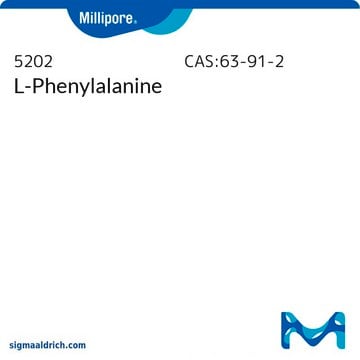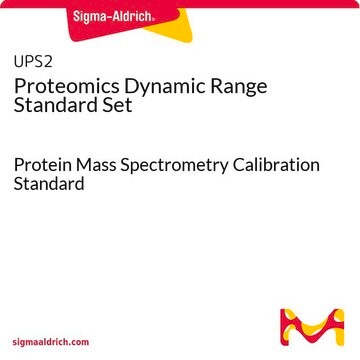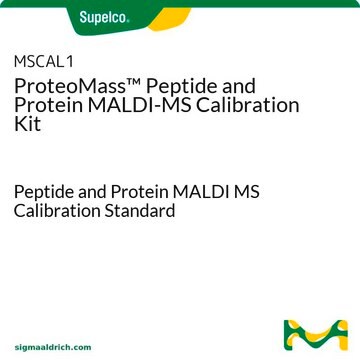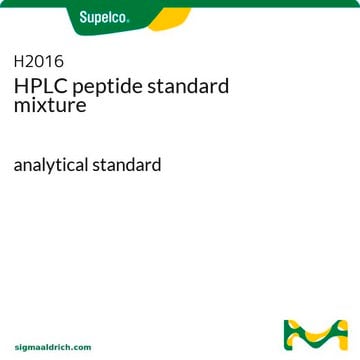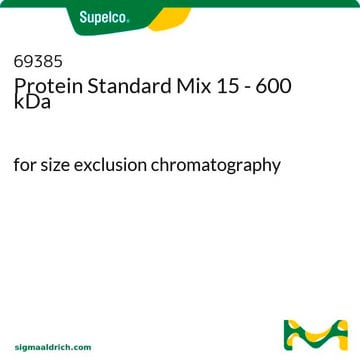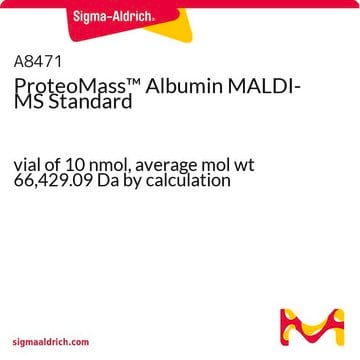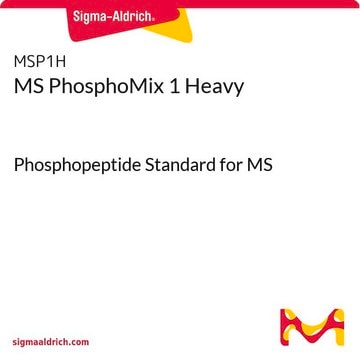UPS1
Universal Proteomics Standard Set
Protein Mass Spectrometry Calibration Standard
Synonym(s):
Standard Set
Select a Size
Select a Size
About This Item
Recommended Products
form
ready-to-use solution
Quality Level
quality
Protein Mass Spectrometry Calibration Standard
technique(s)
mass spectrometry (MS): suitable
storage temp.
−20°C
General description
Application
- Bracketing critical experimental datasets for confirming the robustness of analysis methods
- Comparison of MS or other proteomic data that are generated in different labs using a variety of analytical strategies and instruments
- Identifying limitations of proteomics analysis systems and search algorithms
- An external reference to assist with the evaluation of data derived from poorly defined samples
Features and Benefits
- Test the power of your analytical strategy
- Troubleshoot and optimize your analytical protocol
- Confirm system suitability before analyzing critical samples
- Normalize analytical results day to day or lab to lab
Kit Components Also Available Separately
- T6567Trypsin from porcine pancreas, Proteomics Grade, BioReagent, Dimethylated 20 μgSDS
related product
Signal Word
Danger
Hazard Statements
Precautionary Statements
Hazard Classifications
Acute Tox. 4 Oral - Eye Dam. 1 - Repr. 1B - Resp. Sens. 1 - Skin Irrit. 2 - STOT SE 3
Target Organs
Respiratory system
Storage Class Code
6.1C - Combustible acute toxic Cat.3 / toxic compounds or compounds which causing chronic effects
WGK
WGK 3
Regulatory Listings
Regulatory Listings are mainly provided for chemical products. Only limited information can be provided here for non-chemical products. No entry means none of the components are listed. It is the user’s obligation to ensure the safe and legal use of the product.
PDSCL
Please refer to KIT Component information
PRTR
Please refer to KIT Component information
FSL
Please refer to KIT Component information
ISHL Indicated Name
Please refer to KIT Component information
ISHL Notified Names
Please refer to KIT Component information
Cartagena Act
Please refer to KIT Component information
JAN Code
キットコンポーネントの情報を参照してください
Choose from one of the most recent versions:
Certificates of Analysis (COA)
Don't see the Right Version?
If you require a particular version, you can look up a specific certificate by the Lot or Batch number.
Already Own This Product?
Find documentation for the products that you have recently purchased in the Document Library.
Customers Also Viewed
Articles
High-throughput proteomics advances with improved analysis methods and mass spectrometry.
Related Content
Standardize research with Universal and Dynamic Proteomics Standards, complex and well-characterized reference standards for mass spectrometry.
Active Filters
Our team of scientists has experience in all areas of research including Life Science, Material Science, Chemical Synthesis, Chromatography, Analytical and many others.
Contact Technical Service
